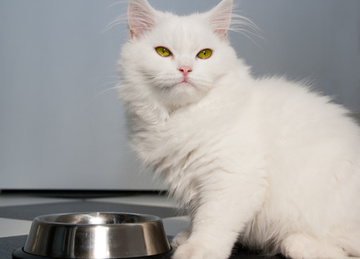Cats must eat a lot of meat for protein and fat. They are carnivores. A cat's system is not designed to process carbohydrates, that is why a diet loaded with carbs can lead to obesity and health issues (like diabetes).
When selecting your cat food let your vet guide you. You should always make sure the label says it meets the standards set by the American Association of Feed Control Officials (AAFCO). That ensures the food meets the minimum nutritional needs for your cat. You can ignore the terms "gourmet", "premium", "natural" which have no standard definition.
Cats are finicky eaters. If your cat doesn't like the food you should try with a different flavor or brand. Cats can go on a hunger strike rather that eat something they don't like. A cat that doesn't eat can suffer liver failure and get fatally ill. If you do the switch from one food to another, introduce the new food gradually and make sure it doesn't cause any gastrointestinal upsets (such as diarrhea).
Indoor cats have a tendency to gain weight. Ask your vet about feeding portions and stick to them (although they may seem little to you). That way your cat will keep a healthy weight. Cats like to eat small meals during the day. If you leave food out your cat may come and graze when they feel the need to nibble. You can put out half in the morning and half when you return from work.
Don't give too many snacks to your pet! Just like with people, too many snacks are not healthy (cat snacks are usually too salty).
If you need to board your cat with Kitty in NY you should provide the food. We also require the feeding instructions (portions and times per day). Give us as much information as possible so the assigned caregiver can follow your feeding routine. Your cat will be happy when he receives the same food during the boarding. You will be able to enjoy your time away from New York without worrying about your cat.


 RSS Feed
RSS Feed

